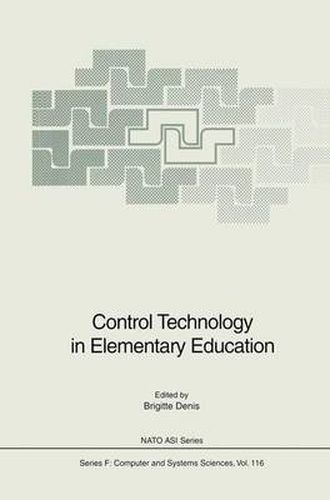Readings Newsletter
Become a Readings Member to make your shopping experience even easier.
Sign in or sign up for free!
You’re not far away from qualifying for FREE standard shipping within Australia
You’ve qualified for FREE standard shipping within Australia
The cart is loading…






This title is printed to order. This book may have been self-published. If so, we cannot guarantee the quality of the content. In the main most books will have gone through the editing process however some may not. We therefore suggest that you be aware of this before ordering this book. If in doubt check either the author or publisher’s details as we are unable to accept any returns unless they are faulty. Please contact us if you have any questions.
Control technology is a new learning environment which offers the
opportunity to take up the economic and educational challenge of enabling
people to adapt to new technologies and use them to solve problems. Giving young children (and also adults) easy access to control
technology introduces them to a learning environment where they
can build their knowledge across a range of topics. As they build and
program their own automata and robots, they learn to solve problems, work incollaboration, and be creative. They also learn more about science,
electronics, physics, computer literacy, computer assisted manufacturing,
and so on. This book, based on a NATO Advanced Research Workshop in
the Special Programme on Advanced Educational Technology, presents a
cross-curricular approach to learning about control technology. The
recommended methodology is active learning, where the teacher’s role is to stimulate the learner to build knowledge by providing him/her
with appropriate materials (hardware and software) and suggestions to
develop the target skills. The results are encouraging, although more tools are needed to help the learner to generalize from his/her concrete
experiment in control technology as well as to evaluate its effect on
the target skills. The contributions not only discuss epistemological
controversies linked to such learning environments as control technology,
but also report on the state of the art and new developments in the field
and present some stimulating ideas.
$9.00 standard shipping within Australia
FREE standard shipping within Australia for orders over $100.00
Express & International shipping calculated at checkout
Stock availability can be subject to change without notice. We recommend calling the shop or contacting our online team to check availability of low stock items. Please see our Shopping Online page for more details.
This title is printed to order. This book may have been self-published. If so, we cannot guarantee the quality of the content. In the main most books will have gone through the editing process however some may not. We therefore suggest that you be aware of this before ordering this book. If in doubt check either the author or publisher’s details as we are unable to accept any returns unless they are faulty. Please contact us if you have any questions.
Control technology is a new learning environment which offers the
opportunity to take up the economic and educational challenge of enabling
people to adapt to new technologies and use them to solve problems. Giving young children (and also adults) easy access to control
technology introduces them to a learning environment where they
can build their knowledge across a range of topics. As they build and
program their own automata and robots, they learn to solve problems, work incollaboration, and be creative. They also learn more about science,
electronics, physics, computer literacy, computer assisted manufacturing,
and so on. This book, based on a NATO Advanced Research Workshop in
the Special Programme on Advanced Educational Technology, presents a
cross-curricular approach to learning about control technology. The
recommended methodology is active learning, where the teacher’s role is to stimulate the learner to build knowledge by providing him/her
with appropriate materials (hardware and software) and suggestions to
develop the target skills. The results are encouraging, although more tools are needed to help the learner to generalize from his/her concrete
experiment in control technology as well as to evaluate its effect on
the target skills. The contributions not only discuss epistemological
controversies linked to such learning environments as control technology,
but also report on the state of the art and new developments in the field
and present some stimulating ideas.